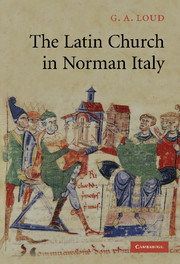Book contents
- Frontmatter
- Contents
- Preface
- List of maps
- List of abbreviations
- Map I Southern Italy: archbishoprics and principal bishoprics
- Map II Southern Italy: abbeys
- Map III The dioceses of Sicily in the late twelfth century
- Map IV The dioceses of the Terra di Bari
- Map V The dioceses of the Terra di Lavoro
- Introduction
- 1 The Church in southern Italy before the Normans
- 2 The Church and the Norman conquest
- 3 The papacy and the rulers of southern Italy
- 4 The papacy and the Church in southern Italy
- 5 The kings of Sicily and the Church
- 6 The Church and military obligation
- 7 The secular Church
- 8 Monasticism
- 9 Latins, Greeks and non-Christians
- Conclusion
- Appendices
- Bibliography
- Index
5 - The kings of Sicily and the Church
Published online by Cambridge University Press: 04 May 2010
- Frontmatter
- Contents
- Preface
- List of maps
- List of abbreviations
- Map I Southern Italy: archbishoprics and principal bishoprics
- Map II Southern Italy: abbeys
- Map III The dioceses of Sicily in the late twelfth century
- Map IV The dioceses of the Terra di Bari
- Map V The dioceses of the Terra di Lavoro
- Introduction
- 1 The Church in southern Italy before the Normans
- 2 The Church and the Norman conquest
- 3 The papacy and the rulers of southern Italy
- 4 The papacy and the Church in southern Italy
- 5 The kings of Sicily and the Church
- 6 The Church and military obligation
- 7 The secular Church
- 8 Monasticism
- 9 Latins, Greeks and non-Christians
- Conclusion
- Appendices
- Bibliography
- Index
Summary
John of Salisbury, that acute observer of Christendom in the middle of the twelfth century, recorded a decidedly unflattering opinion of King Roger. ‘For the king, after the fashion of tyrants, had reduced the Church in his kingdom to slavery, and instead of allowing any freedom of election named in advance the candidate to be elected, so disposing of all ecclesiastical offices like palace appointments’. Two or three years later, John wrote to Pope Alexander, soon after the latter had taken up residence under Sicilian protection at Benevento, advising him not to take ‘the evil practices of the Sicilians and Hungarians’ as a model in relations between Church and state. The contemporary German theologian Gerhoh of Reichersberg also linked the kingdoms of Sicily and Hungary, both of which, he argued, refused to allow appeals by churchmen to the papacy and limited access for papal legates. Another contemporary from the Anglo-Norman world, Peter of Blois, was also very critical of the conduct of the Sicilian rulers, and more especially William II, towards the Church. In 1171 he wrote that the king ‘has on the advice of sinners laid greedy hands on the treasures of the church’, and in another letter, written some eight years later in the name of Archbishop Richard of Canterbury, he claimed that the Sicilian bishops were in the habit of neglecting their dioceses for years on end while frequenting the royal court.
Both John and Peter knew the kingdom of Sicily at first hand.
- Type
- Chapter
- Information
- The Latin Church in Norman Italy , pp. 255 - 339Publisher: Cambridge University PressPrint publication year: 2007



